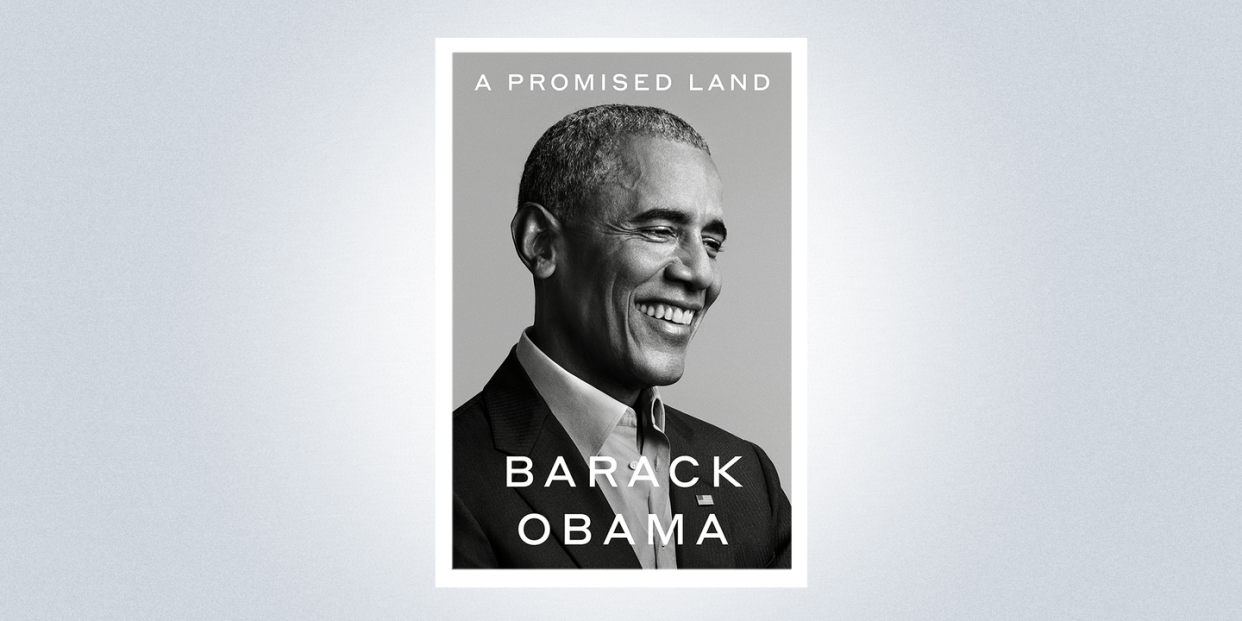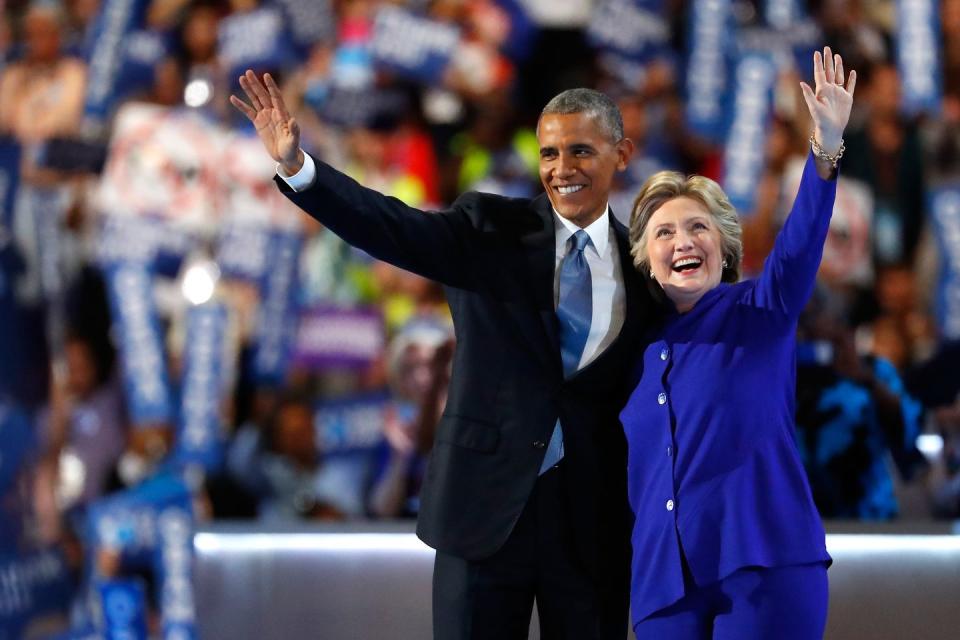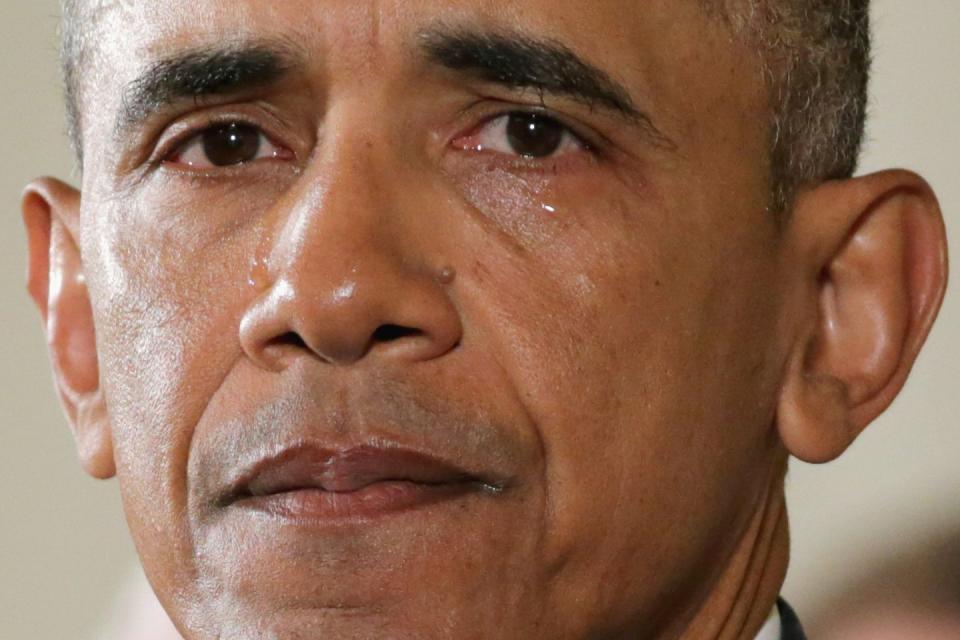Barack Obama Details the Importance of a Peaceful Transfer of Presidential Power in America

- Oops!Something went wrong.Please try again later.
At long last, the wait is over: Barack Obama’s hotly anticipated memoir, A Promised Land, has hit shelves. With a record-breaking $65 million advance, it’s clear that the book’s publisher, Penguin Random House, has bet big on this title—and our first read of the doorstopper book suggests that their investment is well worth it. In these eloquent 768 pages, Obama provides powerful reflection on the state of the American project, along with key insights and new information about pivotal moments in the Obama Administration. Here, we lay out some of the highlights.
Obama hoped to tell a personal story, not just a political story.
In an early excerpt from A Promised Land published at The Atlantic, Obama lays out his goals for the book, writing:
I hoped to give an honest rendering of my time in office—not just a historical record of key events that happened on my watch and important figures with whom I interacted but also an account of some of the political, economic, and cultural crosscurrents that helped determine the challenges my administration faced and the choices my team and I made in response. Where possible, I wanted to offer readers a sense of what it’s like to be the president of the United States; I wanted to pull the curtain back a bit and remind people that, for all its power and pomp, the presidency is still just a job and our federal government is a human enterprise like any other, and the men and women who work in the White House experience the same daily mix of satisfaction, disappointment, office friction, screwups, and small triumphs as the rest of their fellow citizens. Finally, I wanted to tell a more personal story that might inspire young people considering a life of public service: how my career in politics really started with a search for a place to fit in, a way to explain the different strands of my mixed-up heritage, and how it was only by hitching my wagon to something larger than myself that I was ultimately able to locate a community and purpose for my life.
Obama pulls no punches describing the changing face of the GOP.
Obama opines on his successor in these pages, writing about the racial animus stoked by Donald Trump’s birtherism: "It was as if my very presence in the White House had triggered a deep-seated panic, a sense that the natural order had been disrupted, which is exactly what Donald Trump understood when he started peddling assertions that I had not been born in the United States and was thus an illegitimate president. For millions of Americans spooked by a Black man in the White House, he promised an elixir for their racial anxiety."
Obama also examines the dark transformation of the Republican Party, reflecting on the rise of Sarah Palin and what it signified for the future of the GOP. He writes, "Through Palin, it seemed as if the dark spirits that had long been lurking on the edges of the modern Republican Party—xenophobia, anti intellectualism, paranoid conspiracy theories, an antipathy toward Black and brown folks—were finding their way to center stage.” Obama goes on to wonder if John McCain would choose the same running mate again, knowing what we know now about how Palin’s "spectacular rise and her validation as a candidate would provide a template for future politicians, shifting his party's center and the country's politics overall in a direction he abhorred. I'd like to think that given the chance to do it over again, he might have chosen differently.”
Yet even as he rehashes the 2008 election, Obama draws a line in the sand between McCain and the more extremist factions of the GOP. He describes a memorable moment when, as they stood in the well of the Senate awaiting a vote, McCain confided in him that "he couldn't stand a lot of the 'crazies' in his own party." Obama writes, "The disdain he expressed for the far-right wing of his party wasn't an act. And in an increasingly polarized political climate, the political equivalent of a holy war, McCain's modest heresies, his unwillingness to profess the true faith, carried a real cost. The 'crazies' in his party mistrusted him, they considered him a RINO—Republican in Name Only—and he was regularly attacked by the Rush Limbaugh crowd."
Obama describes President Elect Joe Biden as "decent, honest, and loyal."
On the subject of running mates, Obama writes glowingly about his vice president, now-President Elect Joe Biden, recalling how Biden offered a different perspective than his advisors, as well as unique insight into how the actions of the White House could impact congressional Democrats.
On the matter of Biden’s character, Obama writes, "I liked the fact that Joe would be more than ready to serve as president if something happened to me—and that it might reassure those who still worried I was too young. What mattered most, though, was what my gut told me—that Joe was decent, honest, and loyal. I believed that he cared about ordinary people, and that when things got tough, I could trust him. I wouldn't be disappointed."
Yet Obama also takes a moment to razz Biden, writing, "In a town filled with people who liked to hear themselves talk, he had no peer. If a speech was scheduled for fifteen minutes, Joe went for at least half an hour. If it was scheduled for a half hour, there was no telling how long he might talk. His soliloquies during committee hearings were legendary. His lack of a filter periodically got him in trouble."
Obama recalls Biden's initial hesitance to join Obama's ticket, with Biden saying, "If you pick me, I want to be able to give you my best judgment and frank advice. You'll be the president, and I'll defend whatever you decide. But I want to be the last guy in the room on every major decision." Obama committed to Biden's terms, and the ensuing eight years of teamwork set a blueprint for what to expect from the Biden-Harris administration.
Obama recalls the transition from the Bush administration as a gracious transfer of power.
As we watch President Trump threaten American democracy by refusing to permit a peaceful transition of power, Obama's reflection on the transition from the Bush administration rings all the more powerfully. Obama writes of Bush's lame duck period, "President Bush would end up doing all he could to make the eleven weeks between my election and his departure go smoothly. Every office in the White House provided my team with detailed 'how to' manuals. His staffers made themselves available to meet with their successors, answer questions, and even be shadowed as they carried out their duties. The Bush daughters, Barbara and Jenna, by that time young adults, rearranged their schedules to give Malia and Sasha their own tour of the 'fun' parts of the White House. I promised myself that when the time came, I would treat my successor the same way."
Obama is reflective about the mistakes of his administration.
Lest you fear that A Promised Land is a rosy hit parade of successes, Obama acknowledges his own shortcomings and mistakes, describing his failure to pass immigration reform as “a bitter pill to swallow.” He also acknowledges that the economy “stank” entering the 2010 midterms, which allowed the Tea Party to reclaim the House of Representatives. Obama takes personal responsibility for the Democratic loss of House control, writing, "As far as I was concerned, the election didn't prove our agenda had been wrong. It just proved that... I'd failed to rally the nation, as FDR had once done, behind what I knew to be right. Which to me was just as damning."
He may be great at basketball, but Obama never had much game with girls.
A Promised Land isn’t all business—it also touches on Obama’s childhood and personal life. He even pokes fun at himself, describing his young self as an “incessant, dedicated partyer” whose “pseudo-intellectual” strategy for wooing women, which included reading Karl Marx to impress them, “proved mostly worthless.” He also writes somewhat lightheartedly about his smoking habit, which he failed to curb during his early tenure in the White House. In fact, he sometimes discreetly smoked up to ten cigarettes a day, until he was inspired to quit when his daughter Malia “frowned” at the smell of smoke on his breath.

Obama never considered anyone but Hillary Clinton to be his Secretary of State.
Readers of A Promised Land likely remember the heated 2008 Democratic Primary, during which a then-relatively unknown Obama beat out a number of political heavyweights for the Democratic nomination. Though Obama highlights the frustration that Hillary Rodham Clinton experienced, losing to a junior senator, he also writes glowingly of her character and of her challenging life in the public eye, saying, "Maybe it was because in Hillary's story I saw traces of what my mother and grandmother had gone through: all of them smart, ambitious women who had chafed under the constraints of their times, having to navigate male egos and social expectations. If Hillary had become guarded, perhaps overly scripted—who could blame her, given the attacks she'd been subjected to? In the Senate, my favorable opinion of her had been largely confirmed. In all our interactions, she came across as hardworking, personable, and always impeccably prepared. She also had a good, hearty laugh that tended to lighten the mood of everyone around her."
Though their relationship at times grew uncomfortable as they went head to head on the campaign trail, Obama was eager to bring Clinton into the fold after he won the presidency. In fact, she was his first and only choice to serve as Secretary of State.
"I thought Hillary was the best person for the job," Obama writes. "Throughout the campaign, I had witnessed her intelligence, preparation, and work ethic. Whatever her feelings toward me, I trusted her patriotism and commitment to duty. Most of all, I was convinced that at a time when diplomatic relations around the world were either strained or suffering from chronic neglect, having a Secretary of State with Hillary's star power, relationships, and comfort on the world stage would give us added bandwidth in a way that nobody else could."
Obama gets real about the hardest days of his presidency.
On November 17th, the day of A Promised Land's release, Apple TV+ will air an explosive new episode of The Oprah Conversation, in which Obama sits down for a far-ranging conversation with Oprah Winfrey. While speaking with Winfrey, Obama revealed that no event during his presidency saddened and enraged him as much as the massacre at Sandy Hook Elementary School, where twenty children and six adults were murdered by an armed gunman.
"That was not only the saddest day of my presidency. But when Congress failed to do anything in the aftermath of Sandy Hook, that was the angriest I ever was in my presidency. I was disgusted and appalled by the inaction," Obama said.
One month after the horrifying Sandy Hook shooting, a new bill was introduced in Congress to ban military-style assault weapons like the one wielded in the shooting. In April 2013, the Assault Weapons Ban of 2013 was defeated in the Republican-majority Senate, enraging Obama.

"You had parents that had just lost their children sitting in front of senators asking for very modest, reasonable approaches," Obama told Winfrey. "This wasn't some radical agenda. They were asking for more effective background checks and other provisions to keep firearms out of the hands of disturbed folks. And it was all viewed as politics, as opposed to this human moment we should have been able to respond to as a society."
As gun violence continues to scythe through American life, with Everytown reporting that more than 100 Americans are killed with guns every day, Obama feels that the road to a healthier gun culture remains long and daunting.
"I have to say, gun violence is one of those issues that I think we're far away from the 'promised land' on," Obama said. "It's become such a cultural hot button issue. It's become wrapped up with people's sense of identity and the degree to which the country's divided. It's gotten very polarized. Unwinding that polarization around that issue is going to take some time."
Obama hasn't lost hope for the future of the United States—and neither should you.
Though A Promised Land ends with a 2011 meeting in Kentucky, where he is introduced to the SEAL team that would kill Osama bin Laden, Obama pans out to consider the current state of the American project. In the excerpt at The Atlantic, he writes powerfully about his indefatigable hope for the future:
What I can say for certain is that I’m not yet ready to abandon the possibility of America—not just for the sake of future generations of Americans but for all of humankind. I’m convinced that the pandemic we’re currently living through is both a manifestation of and a mere interruption in the relentless march toward an interconnected world, one in which peoples and cultures can’t help but collide. In that world—of global supply chains, instantaneous capital transfers, social media, transnational terrorist networks, climate change, mass migration, and ever-increasing complexity—we will learn to live together, cooperate with one another, and recognize the dignity of others, or we will perish. And so the world watches America—the only great power in history made up of people from every corner of the planet, comprising every race and faith and cultural practice—to see if our experiment in democracy can work. To see if we can do what no other nation has ever done. To see if we can actually live up to the meaning of our creed.
Early reviews praise the book, but don't give it a total pass.
In a sprawling review of A Promised Land, Chimamanda Ngozi Adichie praises Obama’s gorgeous prose and “granular,” “vivid” eye for detail, but criticizes the book for its emotional guardedness, writing, “There is very little of what the best memoirs bring: true self-revelation. So much is still at a polished remove. It is as if, because he is leery of exaggerated emotion, emotion itself is tamped down. We do not get anywhere near a measure of what emotional or even intellectual price he has paid for the many malicious Republican roadblocks.”
Though Obama writes about “resolving the lingering questions of [his] racial identity,” Adichie finds his evocation of race to be lacking, saying that Obama “writes about race as though overly aware that it will be read by a person keen to take offense… racism is always complex, but complexity as an idea too often serves as an evasive device, a means of keeping the conversation comfortable, never taking the full contours of racism to avoid alienating white Americans.”
Perhaps the second volume of Obama’s memoir, which is forthcoming at an unspecified date, will correct the shortcomings Adichie identifies in A Promised Land. With demand expected to be extraordinary, A Promised Land could fly off the shelves mere days after publication. Don’t delay in ordering a copy to take the measure of the book yourself.
You Might Also Like

